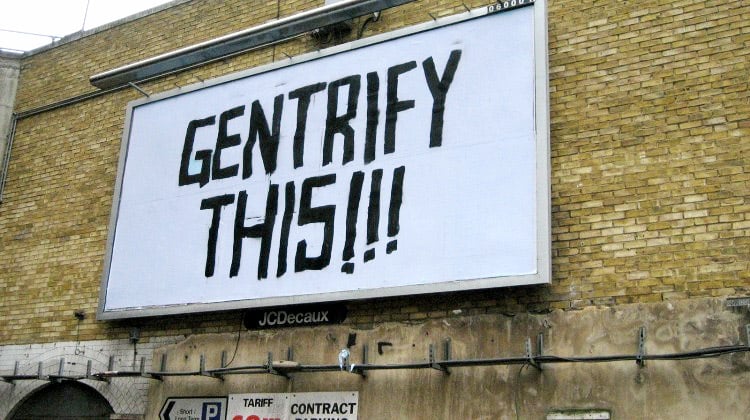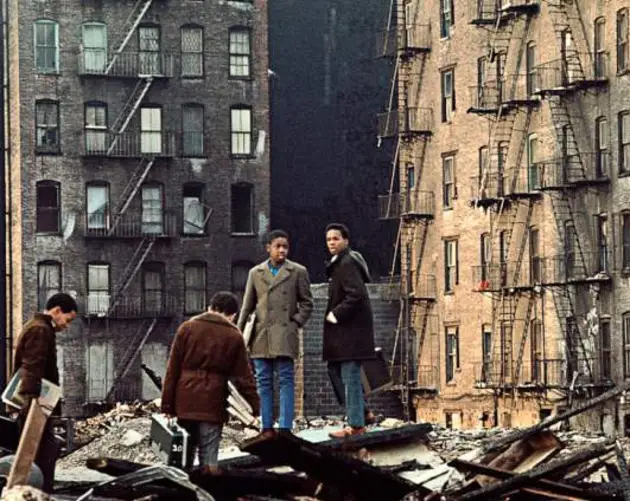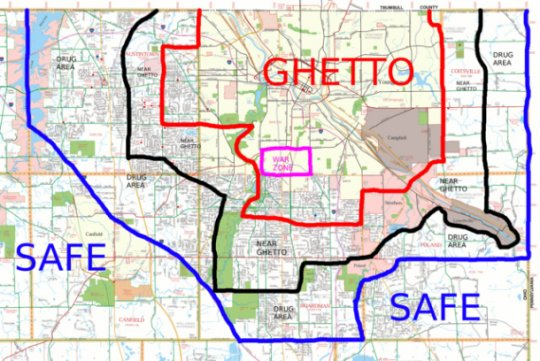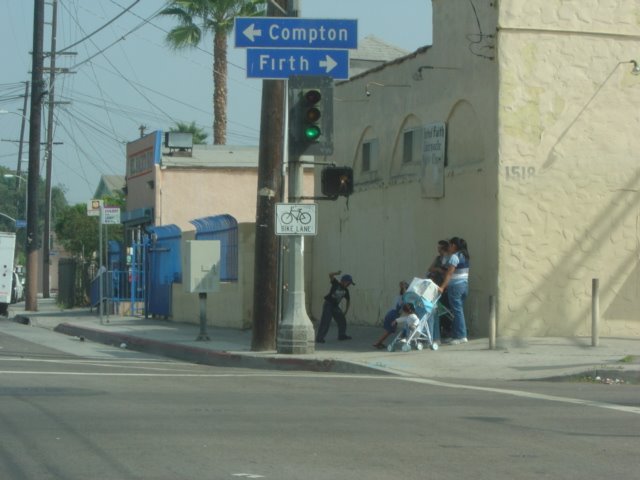Hello Everyone:
It is a very lovely first day of fall and Bruce Springsteen's 70th Birthday. A very important occasion, if Yours Truly does not say so herself. The big news over the weekend comes in the form of a brewing scandal involving a whistleblower's complaint about a phone call between the president and the President of the Ukraine. The whistleblower alleges that the president spoke to the Ukrainian president about exchanging alleged incriminating information on VPOTUS and possible Democratic challenger Joe Biden and his son Hunter for aid. The president alleges that it is all a "witch hunt" and the VPOTUS is guilty of corruption. The story is gathering steam and if true, it would be grounds for impeachment and removal from office. No one is ready to go there yet. If there is a there there, then Blogger will be here to share it with you. Onward.
 |
| everydayfeminism.com |
Today we open the archives of The New Yorker magazine to ask the question "Is Gentrification Really A Problem" (newyorker.com; July 4, 2016; date accessed Sept. 23, 2019). Gentrification has been blamed for displacement of long time low- to moderate-income residents, squeezing out small businesses, homogenization of neighborhoods, loss of historic-cultural resources, and so on. Gentrification is also responsible for community improvements and more community revenue. So is it really so bad? One of the problems in talking about gentrification is the language we use for describing changing neighborhoods. Take the word "ghetto."
.jpg?w968h681) |
| Quentin Tarantino at the 2016 Golden Globe Awards independent.co.uk |
When director Quentin Tarantino accepted the 2016 Golden Globe, on behalf of Ennio Morricone, for Best Original Score for the movie The Hateful Eight, he used the word "ghetto" in his speech. During his moment at the podium, he proclaimed Mr. Morricone his favorite composer. He declared,
...And when I say favorite composer,...I don't mean movie composer--that ghetto. I'm talking about Mozart. I'm talking about Beethoven. I'm talking about Schubert....(Ibid).
The backlash came a very swift few minutes later, when the next presenter Jamie Foxx stepped up to the microphone, smiled, checked out the audiences, shook his, tutting Ghetto (Ibid). That became the big story the next day.
The Washington Post's television critic Bethonie Butler called Mr. Tarantino's "ghetto" comment a tone-deaf flub (washingtonpost.com; Jan. 11, 2016; date accessed Sept. 23, 2019) and a BBC headline blared Is The Word Ghetto Racist (bbc.com; Jan. 15, 2016; date accessed Sept. 23, 2016). The article that followed the bold faced headline summarized the ideas of a Rutgers University professor who accused the director of Once Upon a Time... Hollywood of inferring that ...the ghetto was not a place for a white, European, male composer (newyorker.com; July 4, 2016)
 |
| youtube.com |
"Ghetto" is a European word that originated in the sixteenth century in reference to the section of Venice, Italy where the Jewish as population was confined. In his use of the word, Mr. Tarantino used the common dictionary definition:
something that resembles the restriction or isolation of a ghetto (Ibid).
However, the colloquial use of "ghetto" is in reference anything cheap or trashy. The adjectival definition of ghetto draws on the fact "that a modern American ghetto is not only poor but disproportionately African-American. Recent census showed that 2.5 million white live in high-poverty neighborhood, compared with five million African-Americans" (Ibid). During the 2016 primary season, then-candidate Senator Bernie Sanders went one step further, When you're white, you don't know what it's like to be living in a ghetto (Ibid). He is right but Yours Truly doubts he speaks from experience.
 |
| 1970s New York City allthatsinteresting.com |
What is a ghetto and who lives there? In Kenneth Clark's 1965 sociological study Dark Ghetto, Mr. Clark painted a grim picture of Harlem. He described it as "a paradigmatic ghetto, as a 'colony of New York City,' defined by both its economic dependence and its segregation (Ibid). In the decades that followed, academics argued over the usage and limits of the word--"did it apply to any poor neighborhood, any ethnic enclave?" (Ibid). In 2008, sociologist Mario Luis Small argued that in many ways, poor black neighborhoods were neither distinctive nor homogeneous as the word "ghetto" implies. He warned that academic theories of ghetto life could perpetuate the very stereotypes their proponents often aim to fight (Ibid)
 |
| Example of redlining stereotypicallyracist.wordpress.com |
 |
| South Central, Los Angeles, California ghetto.blogspot.com |
The modern history of ghettos in the United States begins with a misunderstanding: "the term acquired its awful resonance because of the Nazi ghetto, even though the condition in America cities more closely resembled those of the older European ghettos,..." (Ibid). This distinction is important to note.
In 1945, St. Clair Drake and Horace Cayton published Black Metropolis: A Study of Negro Life in a Northern City. When they wrote about the Black Ghetto of Chicago, they referenced a provocative analogy. Mr Duneier observed, "in explaining how blacks were prevented from buying or renting homes in white neighborhoods, Drake and Cayton referred to the invisible barbed-wire fence of restrictive covenants (newyorker.com; July 4, 2016). The idea was to evoke the horrific imagery of Third Reich ghetto, something Mr. Duneier struggles to demonstrated that was not a revival of European history but a break from it. The two cannot even be compared. The 16th century Venetian ghettos were onerous but not set in stone but residences were occasionally allowed to leave during the day and return at night. The Nazi version was a warehouse for either slave labor or death.
Beginning in 1934 and continuing for thirty years, the Federal Housing Authority steered banks away from writing mortgages to prospective home buyers in poor African American neighborhoods, considered too risky. Potential homeowners were considered uncreditworthy or blocked by restrictive neighborhood covenants. Essentially, White homeowners wanted to expand their neighborhoods into contiguous white areas as they got too crowded but did not particularly care to live with whites (Ibid).
 |
| South Vermont Avenue Los Angeles, California homicide.latimes.com |
Scholars who study the ghettos are typically motivated by sympathy for its residents, which results in a complicated sense of sympathy for the actual place. Kenneth Clark, in his study on Harlem, spent time with Malcolm X who insisted that complete segregation (Ibid) was the only way to remedy America's problems. Mr. Clark expressed a certain skepticism about Malcolm X's dictate and the prospects of school disintegration. He believed that the better way was to demand excellence in ghetto schools, as Mitchell Duneier described it (Ibid).
Anthropologist Carol Stack, in her influential 1974 book All Our Kin, suggested that the African American ghettos fostered a sense of social network among family and friends. At the same time, scholars have tried to find a solid relationship between the word "ghetto" and the Spanish-language analog barrio, comparing poor black neighborhoods with similar communities. In 1970, when activist Carl Whitman declared We have formed a ghetto, out of self protection, he described a different kind of separatism: He wrote about his adopted home town of San Francisco in the pamphlet "A Gay Manifesto" (Ibid).
 |
| Historic American ghetto photograph npr.org |
In contemporary use, the word ghetto has become a noun. It connotes a less intimidating image of a penny-pinching coffee shop customer. On hip-hop record, ghetto has morphed into 'hood which sounds more warm and less like a condition than a community, For example, Kendrick Lamar's ode to the days gone by is "Hood Politics," not "Ghetto Politics" (Ibid). The continued residential segregation has become a "relationship between concentrated poverty and African-American neighborhood, and made the word 'ghetto' harder to use" (Ibid). Ghetto has become an indictment of a place and people.
Whatever concerns about the word we may have, may have something to do with our changing views of the city. Many of the studies in MItchell Duneier's book were conducted in context to the white flight and rising crime rates. This implies a a particular type of dysfunction indigenous, possibly inseparable, to urban environment. Few people talk about cities in this way anymore--perhaps with the exception of Jane Jacobs who dedicated herself to the radical idea that urban life could be pleasurable. Read anything on urban life an you think all anyone talk about is the g-word: gentrification a process that make the ghetto cease to be ghetto.
No comments:
Post a Comment